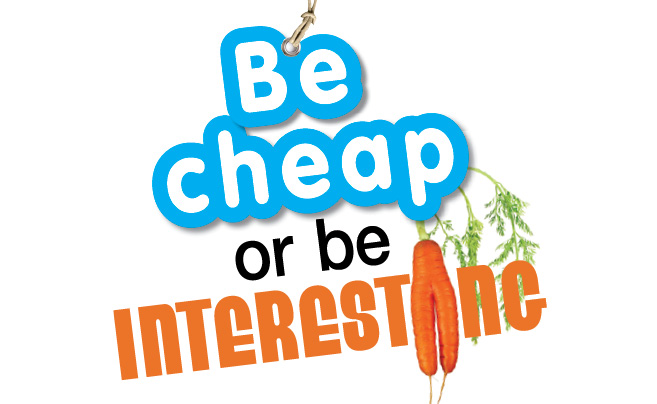Last year, I heard the COO of Kmart, Ian Bailey, speak at the PWC Retail Breakfast series.
The one thing that struck me was that once they had made the decision to build a brand anchored in ‘cheap’, the business had to be consistent with that strategy throughout the whole supply chain.
Patagonia, on the other hand, has carved out a unique positioning in a different way. The upmarket outdoor-clothing company preaches the value of the simple life, and takes a stand against conspicuous consumption by urging us to consume less. Far beyond a genius marketing ploy, the company walks the walk by offering a repair service for its clothing and by providing a platform for its customers to re-sell their Patagonia goods on Patagonia.com or eBay.
In a world that screams at us to consume more, Patagonia’s stance is a breath of fresh air. And it is undoubtedly interesting.
Another interesting brand—renowned for its ethical stance on food waste—is the third largest supermarket chain in France, Intermarché. In 2015 the company implemented a global campaign to elevate the perception of ‘ugly’ fruit and vegetables by selling the imperfect groceries at a 30-per-cent discount.
By rebranding them as ‘inglorious fruits and vegetables’ and devising a significant media campaign—that ran across print, billboards, TV, radio, and Intermarché’s catalogues and social media platforms—the company addressed the issue of food waste and drew attention to broader problems of image and perfection in modern-day society. Intermarché has therefore positioned itself as both cheaper and more interesting.
Most CEOs today accept that their financial success will come from their brand’s reputation, and therefore the brand has become a strategic asset and part of the financial conversation at the top table. PWC’s 2016 Annual Global CEO Survey shows that globally, CEOs recognise that brand (traditionally a nonfinancial asset) should be in the top three things measured for this year.
What this means is that you must have a clear and differentiated brand positioning or brand story. If brand is finally to be measured at that top table, it must stand for something. And standing for something these days means being cheap or being interesting—because, quite frankly, there is nothing in the middle.
Okay. Back to Kmart. Kmart is the cheapest—what is Target if it’s not the cheapest? Think Aldi v. Woollies. Aldi will win on price—what is Woolworths if it’s not the cheapest? Dan Murphy’s price-checks every day to make sure it is the cheapest. So what is Liquorland?
You can download the full article below…







